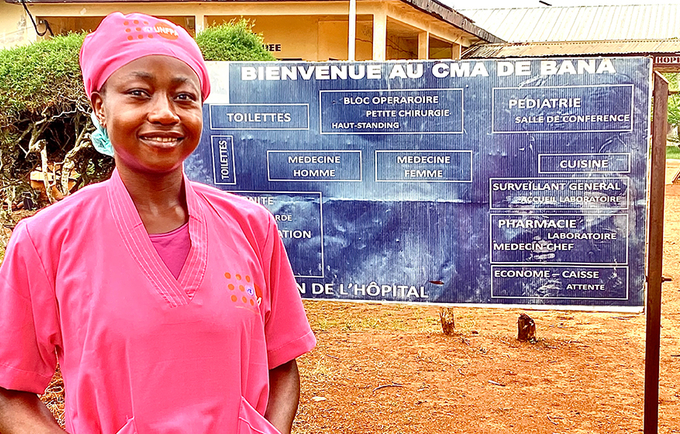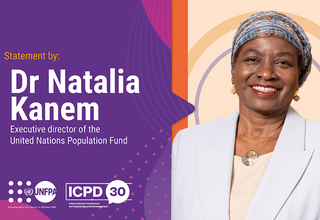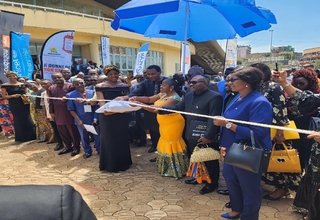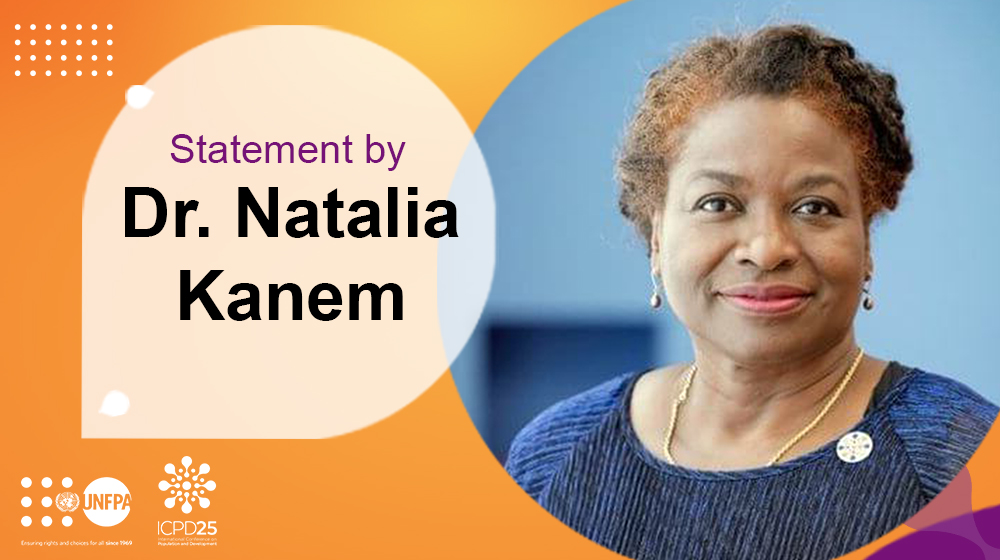Bana, West Region of Cameroon: Cameroon is expecting about 1,067,679 live births for this year 2024(Virtual Documentation Center for the Health Sector, 2024). The West Region alone would be contributing 97,000 live births to this number. One of the highest rates in the entire country. This reality also touches Bana, Haut-Nkam Division in the highlands of the West Region. In this subdivision of about 30,000 persons lies the Subdivisional Hospital of Bana operating alongside 5 integrated health centers to cover the needs of pregnant and nursing mothers alongside all other health needs of the population. Access to quality reproductive health services has been a challenge to women and girls in Bana, due to the absence of qualified personnel. This was the case until Stella came in.
It’s been six weeks since Stella, a state trained midwife, was recruited and deployed by UNFPA in partnership with the United Nations Volunteer programme, at the Bana Subdivisional Hospital. Her swift gait gets her in and out of the maternity ward to watch over her patients: newly delivered mothers and their newborn babies. Despite her duty conscious strides, she doesn’t fail to offer a smile here and there to family members waiting in the corridors. Just six weeks in and the facility is already feeling the change she has brought. “We have more women coming from Bafang and other surrounding villages for their Antenatal Care and delivery. We used to have about 10 women for antenatal care every month. Now, we have about 20.” says Dr. Ewane, General practitioner at the Hospital. Dr. Ewane has been posted at the hospital facility for the past five years and is impressed at how Stella’s presence is impacting the patient turnout for Reproductive Health Services in such a short while.
A response to support local authorities in their desire to improve access to reproductive health services for their population.

Health at Bana Technical Highschool
during the mobile clinics. Photo credit:
UNFPA, Bana December 2022
The West Region has, since 2017, been home to thousands of Internally Displaced Persons (IDP) as a spillover effect of the socio-political crisis in the North West and South West Regions of Cameroon. UNFPA, with funding from the European Union, has ensured sexual and reproductive health services and protection from Gender-based violence for a couple of years in areas in the West with highest concentration of IDPs. When funding ended, UNFPA decided to continue engagement in the West and run a mobile clinic offering sexual and reproductive health services precisely in the Bana Subdivision, in December 2022. The mobile clinic offered counselling, family planning, HIV and STI screening as well as sensitization on GBV. Following this high impact campaign, UNFPA deployed a midwife responding to strong recommendations for permanent services rather than one-off campaigns, which came from women in the community as well as local authorities.. “A lot of women appreciated the last campaign. So many came out and that is when we realized the need for such services was high.” Dr. Sosthene Nodem, Head of the Bana Subdivisonal Hospital shared and continued ; “ It is always important to have qualified personnel, namely a midwife, to carry out specific tasks. It is part of the technical platform and it strengthens it.”
In alignment with local development strategies, UNFPA worked in close collaboration with UNV and the Bana City Council to recruit a midwife from the locality for a rapid integration and acceptance from the community. On February 8th 2024, Stella Tchiwobe began working in her new position at the Bana Subdivisional Hospital. “…Her presence will greatly be of help to the women who have been carrying out deliveries in different health centers. These nurses who are not trained midwives…but they do deliveries out of habit. I think the presence of a midwife will help them a lot by honing their skills to be able to better carry out deliveries.” Mr. Sanga Jean-Baptist, Mayor of Bana. Besides the mayor, Stella’s recruitment has also been greatly appreciated by Mr. Bob-iga Emmanual, Subdivisional Officer of Bana. “Her contribution is undeniable when considering the fact that issues related to sexual and reproductive health are a concern, especially in an environment where tradition is very much present. During the celebration of the 39th edition of International Women's Day, she took an active part through educational talks to women, on family planning, breastfeeding and maternal health.”
Saving the life of a mother and her twin babies.

Mayor of Bana. Photo:
UNFPA, Bana-March 2024
Two weeks after taking up service, Stella led the delivery of Toukam Mirabelle and her twin boys Tieumeni and Fomenyi, from the nearby village of Bakassa. Mirabelle met Stella on her last Antenatal visits. “I met Ms. Stella on my last but one visit. This was my first time meeting a professional midwife. The kind of advice she gave me on how to take care of myself and of my babies was so instructive, so different and so reassuring. I really felt safe and at ease with her. This is my third delivery and no one ever advised me like she did” Mirabelle says, smiling.
Mirabelle was informed that twin pregnancies hardly ever went beyond 8 months and 2 weeks. However, hers went beyond due date thus keeping her in doubt and stressed about the delivery.
Her first contractions came unexpectedly on the 21st February 2024 at 9pm. The distance to the health facility and the danger of moving at night, forced Mirabelle to wait until daybreak, delaying her arrival by about 11 hours. This situation greatly exposed her to a tough risk of losing her life or that of her babies. “By the time I got to the hospital, I wasn’t feeling any more contractions. I was worried.” Mirabelle narrates. On arrival, she didn’t meet the midwife but the nurses on duty.
“The day I came to deliver, Ms. Stella was out of the hospital. The personnel I met could only hear the heartbeat of one of the children. That of the second seemed to be too weak.” Said Mirabelle. “I had to call Ms. Stella to make sure she was next to me at this point. I needed her reassurance.” she continued.
A few minutes after receiving this call, Stella arrived at the hospital to attend to Mirabelle. On arrival, she found the theatre ready for surgery. “Her last antenatal visits didn't present anything to worry about. When I arrived, I re-examined Mirabelle, I could clearly hear both heartbeats. I shared with my colleagues that this could be handled without a cesarean section. They trusted me and we all went in to carry out the delivery.” Stella narrates. After about an hour in the delivery room, Mirabelle safely gave birth to her two bouncing baby boys of 3kg each, with no complication nor tears. Her family hasn’t stopped expressing gratitude to Stella since then.

Photo: UNFPA, Bana-March 2024
“She was truly amazing all along. If not for her, I would have had an operation. I am so glad she was there.” Mirabelle says with a broad smile. “When I shared my story with the women around me, many said they will go for their antenatal care at the Bana Subdivisional Hospital from now on. They want Ms. Stella to take care of them too.”
Beside deliveries, more and more women come to the Subdivisional Hospital to receive Family Planning counselling and services and for gender-based violence and sexual health issues in general.
UNFPA advocates for the training, recruitment and empowerment of more midwives.
According to the 2018 Demographic Health Survey, Cameroon has a maternal mortality rate of 406 deaths for 100,000 live births. A figure which the government and its partners are trying to take down to 140 by 2030. UNFPA in particular has a commitment with the government of Cameroon, to increase by 10% skilled birth attendance before 2026. UNFPA firmly believes that well-trained midwives working in a fully functional environment could help avert roughly two thirds of all maternal and newborn deaths, according to the most recent State of the World’s Midwifery report. They could also deliver 90 per cent of all essential sexual, reproductive, maternal and newborn health services, yet because they are both underutilized and in short supply, they account for only 10 percent of those currently providing these services.
Cameroon presently totals 860 midwives in the public sector ( fichier.minsanté.cm) across the national territory while the demand for their services is estimated at about 2454 midwives as per the number of women of childbearing age. This situation can be associated with the low recruitment rate and inadequate infrastructure. As part of its 8th Country Program, UNFPA supports the quality of initial training for midwives through International Confederation of Midwives accreditation of 6 Midwifery schools.

pregnant woman. Photo: UNFPA, Bana -March
2024
Besides Stella, UNFPA has recruited about 34 midwives deployed to provide firsthand reproductive health services in development as well as humanitarian contexts across the country. The initiative aims to carry further the advocacy for this profession to receive full support and empowerment by the government to efficiently end maternal mortality.
More midwives in the health system will enhance care and save lives for women and their newborn babies in Cameroon.




